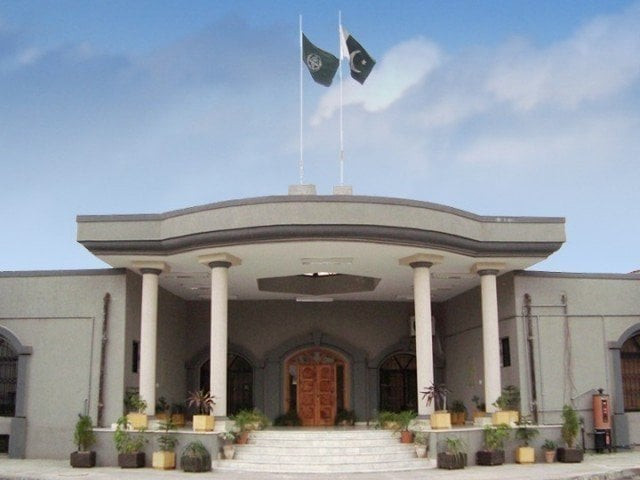IHC strikes down PECA ordinance
Court says its violates Article 9, Article 14, Article 19, and 19-A of Constitution

The Islamabad High Court (IHC) on Friday declared the amendments to the Pakistan Electronic Crimes Act (PECA) through an ordinance promulgated in February this year as “unconstitutional”.
The decision was announced by IHC Chief Justice Athar Minallah while hearing petitions filed against the PECA ordinance by the Pakistan Broadcasters Association (PBA) and other media bodies.
In a four-page order, Justice Minallah declared Section 20 of the PECA law “null and void”.
The IHC has also ordered an investigation into the abuse of power by the Federal Investigation Agency (FIA) under the PECA law and the interior secretary has been directed to submit a report in this connection within 30 days.
The court said the cases registered under Section 20 of PECA had been dismissed.
Read PFUJ announces 'Black Day' against PECA Ordinance on Feb 28
The IHC said the government was expected to review the legislation concerning defamation as freedom of expression was one of the fundamental rights.
“Access to information and freedom to express opinions are vital for a vibrant society,” the verdict read, adding that attempts to undermine these rights were contrary to the democratic spirit and against the Constitution.
The interior secretary needed to launch an investigation into the conduct of FIA’s cybercrime officials over rampant abuse of power by the government agency.
It further stated that the PECA ordinance violated Article 9, Article 14, Article 19, and 19-A of the Constitution.
“The Prevention of Electronic Crimes (Amendment) Ordinance, 2022 and promulgation thereof is declared as unconstitutional, invalid beyond reasonable doubt and it is, therefore, struck down,” the verdict read.
“The offence under section 20 of the Prevention of Electronic Crimes Act, 2016 to the extent of the expression “or harms the reputation” and the punishment thereof is unconstitutional, invalid beyond reasonable doubt and is, therefore, struck down,” it added.
The court also declared that the proceedings against the petitioners in the connected petitions are consequently a nullity and thus quashed. “However, the aggrieved complainants would be at liberty to avail the remedies provided under the respective laws in the context of defamation.”
The court expected the federal government to review the defamation laws, particularly the Defamation Ordinance, 2002 and thereafter propose appropriate legislation to parliament for making its implementation effective.
Read MQM-P leader asks PM Imran to drop idea of amending PECA
The Council of Pakistan Newspapers Editors (CPNE) lauded the high court for its decision. CPNE President Kazim Khan said an independent judiciary was imperative for constitutional supremacy.
In February this year, President Dr Arif Alvi promulgated the PECA ordinance, making online public defamation a cognisable and a non-bailable offence and also increasing the jail term for defaming any person or institution from three years to five years.
Before the ordinance came into effect, Section 20, which pertains to the registration of complaints against individuals by aggrieved parties over defamation, was a bailable and non-criminal offence.
Expressing his displeasure, the judge reprimanded FIA Cyber Crime Wing Director General Babar Bakht Qureshi for monitoring journalists.
“Is monitoring journalists a part of the FIA’s duties?”
At the outset of the hearing, the FIA officials submitted a report to the court on its directives. IHC chief justice remarked that somebody must be held answerable on the violation of basic human rights. The FIA had submitted standard operating procedures (SOPs) before the court but they were being violated as well, the court observed.
The IHC noted that the department had included PECA sections in various complaints without them being applicable in those matters.
The FIA Cyber Crime Wing DG replied that a law had been formulated and the department was under intense pressure to implement it.
Justice Minallah noted that a case was registered against an individual in Islamabad, they were arrested in Lahore, and the raid was carried out in the federal capital. He added that the local police were also at fault in this scenario.
“Have you taken a similar action for a common man? If you would have, then the court would have backed you in this case.”
The FIA official told the court that in several cases, the department arrested the accused before the registration of the first information report (FIR) and the cases were filed once the recoveries were made from them.
Justice Minallah expressed his annoyance over this practice and asked under what law the FIA could arrest somebody in this manner. “The FIA even has no regret on its practice and still giving arguments in its support,” the judge added.
After listening to the arguments, the court reserved its judgment and later dismissed the amendments to PECA. The court observed that the freedom of expression was a basic human right and access to information was necessary for the prosperity of a society.
(With input from APP)



















COMMENTS
Comments are moderated and generally will be posted if they are on-topic and not abusive.
For more information, please see our Comments FAQ